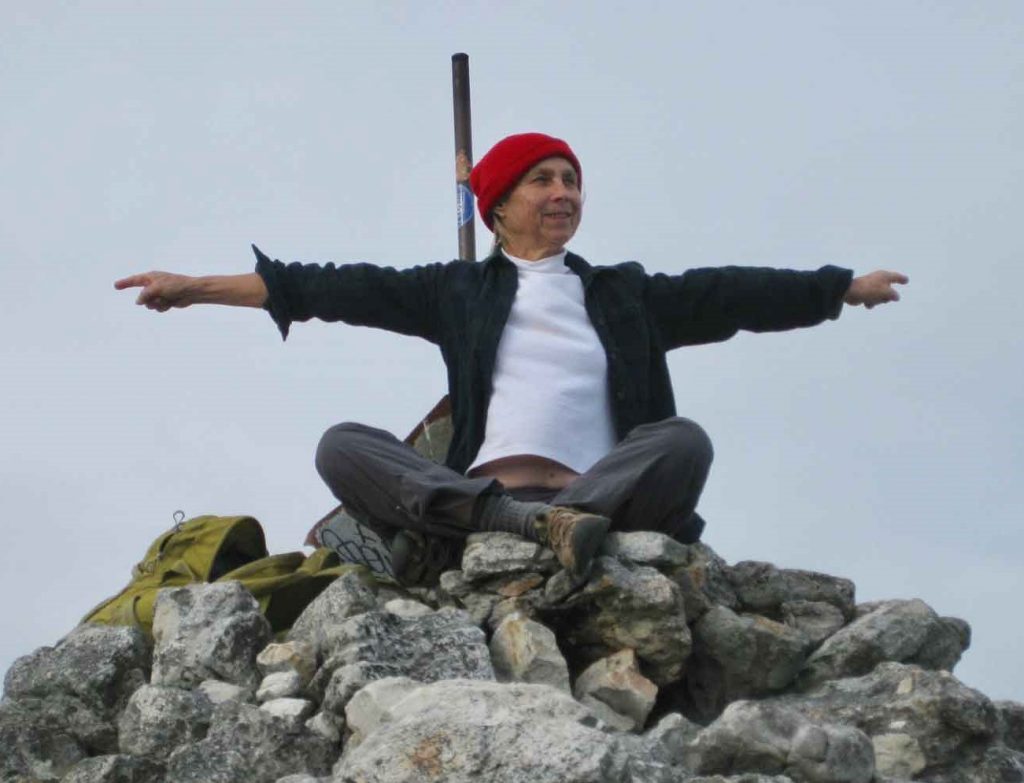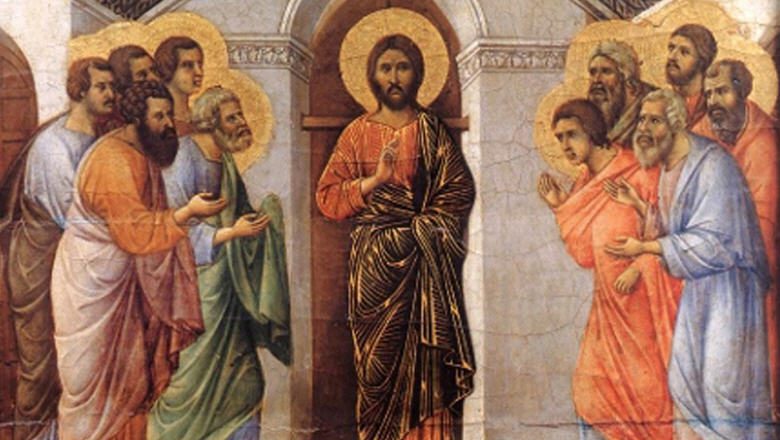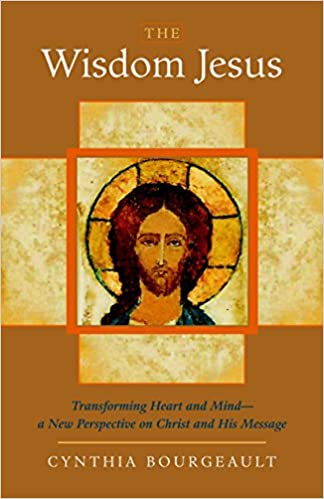By Rev. Hugh Blair
Recently, I started reading a book for our weekly book study group my wife and I attend on Mondays. The book is entitled The Wisdom Jesus and it is written by Cynthia Bourgeault. It is not a new book, it was written in 2008, but it contained some information that I had never seen before and certainly hadn’t thought about.
I have never before presented a sermon focused on one book. I will not be giving you a book review today, because I haven’t finished reading the book yet. But I want to share with you some of of the ideas at the book’s beginning. I am finding them significant for my spiritual journey and I hope you will, too.

As background, you need to know just a bit about Cynthia Bourgeault. She was raised as a Christian Scientist and attended a Quaker school. Growing up, this caused her to ask a lot of questions. She calls herself a seeker and discovered it was important for her to learn how to seek. Her studies include the work of Gurdjieff, Sufisim, a bit of Vedanta and Kaballah studies. She has practiced Centering Prayer for over thirty years and written an important book about it. She is an Episcopal priest, a writer, and a retreat leader. Most recently she has joined the faculty of the Center of Action and Contemplation founded by Fr. Rohr in New Mexico.
She got my attention immediately with a quote which prefaced the first chapter: “If you are searching, you must not stop until you find. When you find, however, You will become troubled, your confusion will give way to wonder. In wonder you will reign over all things, Your sovereignty will be your rest” (The Gospel of Thomas).
Those words come from the Gospel of Thomas which was discovered among the Nag Hammadi scrolls in Egypt in 1945. We’re more familiar with a shorter quote, “Seek and you will find” quoted in the canonical gospels. The additional words describe what seeking and finding really means. We seek to find, but the finding leads to confusion, disorientation. Our old idea balloons get busted, old paradigms get shaken. Gradually we discover the wonder of the new. Wonder blankets us and we come to rest on a new foundation. And the process continues, into the next round.
This quote is a preface to where the author wants to take us in her book. She wants to give us a new take on Jesus – a new look at him as Master in an ancient spiritual tradition called Wisdom. She warns us that it might be troubling.
The problem is we Christians think we know a lot about Jesus. We’ve heard the story a million times. He was born in a manger, grew up in a faithful Jewish family, started his ministry after being baptized by John, taught people using parables, he healed the sick, made religious people angry, was brought to trial, punished with crucufixion, was declared dead, placed in tomb, later rose from dead, and ascended to heaven. The church now asks us to believe all that and that it is everything we need for personal salvation.
But Dr. Bourgeault asks us this question: “Would it make any difference to you if the Resurrection hadn’t happened?” She admits it is a trick question. Of course, it would make a difference. Many Christians believe the Resurrection proves that Jesus is the Son of God, that he reconciled heaven and earth and pointed to the Reign of God.
But maybe we are missing something here. Dr. Bourgeault raises a point I never considered: What about the first disciples, Peter, James, John, Andrew and the rest? For them the outcome was yet unknown. The crucifixion and resurrection were unknown to them. They hadn’t experienced that yet. They didn’t know about it. What made them leave their jobs and families to follow Jesus? What did they recognize in Him that moved them to make radical changes in their life? What caused them to say “Yes”?
I am a seeker, and I want to find Jesus. But without the crucifixion and resurrection what did the disciples see? I found the question troubling, even shocking. My simple, clouded understanding, couldn’t immediately answer the question. I had been unaware of another way to see Jesus. I needed to be awakened to a new view.

The answer Dr. Bourgeault proposes is Wisdom Teacher. The first disciples would have seen Jesus as a Wisdom Teacher. He emerges out of an ancient tradition called “wisdom”, sophia perennis, which can be found in all the great religious traditions of the world today. It is primarily concerned about transformation. Transformation from what? Well, from animal instincts and ego-centricity, into love, a special agape love, and compassion; from a judgemental and dualistic worldview into a oneness of acceptance. Jesus emerged out of nowhere teaching and healing and embodying, living, a message that was radical then, and is still radical today.
We don’t know much about Jesus’ background, but he wasn’t a hick. He was literate. He could read and write. And he lived in Galilee at a cultural crossroads. The Silk Road passed through Capernaum and brought with it not only merchandise, but the philosophies and religious ideas of the East. Jesus was probably familiar with some of the ideas of the Buddha and the Persians. Many think John the Baptist was associated with the Essenes, so it is possible Jesus knew about their practices. It is likely that Jesus had some kind of apprenticeship in the learnings of the day and deep familiarity with the scriptures and practice of Judaism. He was learned in what we would call today spirituality.
The disciples would have met a person with a different kind of knowing. It wasn’t ordinary knowing. It wasn’t right brain thinking. It was intuitive knowing, a knowing of the heart. It was a knowing that connected Jesus with people. He connected with people with attention, insight, and caring. People wanted to be with him. He attracted people. They wanted to talk with him and hear him speak. He was comfortable to approach. Some wanted to touch him. He met people where they were, heart-to-heart.
The disciples would have met a person with spiritual energy. Jesus had developed a consciousness extraordinaire. He was awake to the core of his being. His soul was on fire for God and with God. He projected confidence and a loving, compassionate authority.

Let’s take an example of his connection with the disciples, in the story about them fishing with nets. Jesus was standing in a crowd of people when he saw them. The fishermen were cleaning their nets after a night of fishing. They had caught nothing when Jesus walked over and started talking with them. He told them to try again, to put out into deeper water. This time their nets were filled, overflowing and breaking.
How do you think the fishermen/disciples experienced this story? First, Jesus met them in their work. Their work was of primary importance. They were dependent on fishing as their livelihood. The full net was a manifestation of having their needs met. The fish represent having enough. They had in hand their daily bread, which was no small thing. Fishermen and their families were known to experience food scarcity and long winters. Enough food was a life-giving event. But the full net indicates provisions beyond the immediate moment. They can eat again tomorrow. And the food becomes sustenance for others. It signals a world in need beyond these fishermen. The surplus can bring life to a community. The disciples say “Yes” to Jesus’ call of knowing abundance and provision. This is the way God works. They have connected with something moving and powerful. It will sustain their life.
And there are other examples: the Samaritan woman at the well, the centurion whose servant was sick; the blind man alongside the road to Jericho. Jesus was a giver of life. He woke people up. He gave them bigger worlds to live in. He restored people to community.
That’s not a Saviour, that’s a Life-giver.
For the earliest Christians Jesus was not the Saviour, but a Life-giver. Jesus wasn’t saving people from the world, he was restoring people in the world. He was bestowing life, transforming people, making people alive. The Christianity of the East saw things differently than the West sees things. Christianity in the East was a path of Wisdom. Jesus was a person whose life was full, integrated, and flowing. Jesus’ disciples saw him as a master of consciousness. Today we would call him “the Enlightened One”.
Jesus doesn’t want to save people from the world; he wants to transform them in it.
A wisdom Christianity focuses on the path. It emphasizes how Jesus is like us, how what he did in himself is something we are called to do ourselves. From the Gospel of Thomas and the Nag Hammadi collection, from Syriac liturgies, from African desert fathers and mothers, from Celtic poetry, the same picture of Jesus emerges.. “Yes,” says Jesus, “as I am, you, too, can and must become. I will be here to help you. But you must do it yourself.”
So, keep on seeking, keep looking, and you will find Jesus looking for you; wanting to be present to you. This Jesus might be troubling or even confusing, but when you adjust to the new meaning, this Jesus gives you life abundant. When you own that new life as your own experience, you will be caught up in the wonder of it all. That’s what it was all about between Jesus and the first disciples.
Discussion questions: Would it make any difference to you if the Resurrection hadn’t happened Why do you think the first disciples said “Yes” and followed Jesus?


